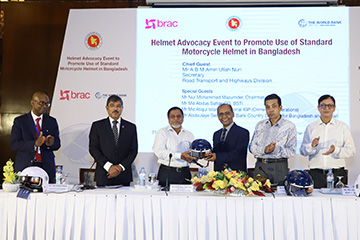
A discussion event focusing on the importance of the use of national safety standard helmets for motorcycle riders took place today on Sunday (21 May) at the Pan Pacific Sonargaon Hotel. Key personnel of government, World Bank, civil society, private sector, and non-governmental organisations involved in this issue participated in the discussion.
BRAC and the World Bank jointly organised the advocacy event.
Chief guest at the event was ABM Amin Ullah Nuri, Secretary, Road Transport and Highways Division. Nur Mohammad Mazumder, chairman, Bangladesh Road Transport Authority (BRTA); Md Abdus Sattar, director general, Bangladesh Standard and Testing Institution (BSTI); Md Atiqul Islam, additional inspector general of Police (crime and operations); and Abdoulaye Seck, country director for Bangladesh and Bhutan, World Bank, were special guests of the programme.
The welcome speech by Dipan Bose, senior transport specialist, World Bank, and team leader, World Bank-financed Bangladesh Road Safety Project, highlighted that “The World Bank recognises the importance of road safety as a critical development priority. We are committed to working together with the Government of Bangladesh and all relevant stakeholders in this endeavour”.
Chief Guest of the event Road Transport and Highways Division secretary ABM Amin Ullah Nuri in his speech said, "I am not for restricting motorcycles as a mode of transport. What we need to do is ensure safety. We have to remove substandard helmets. I request all from the NGOs to other stakeholders to move forward to create awareness. The government cannot alone implement the standard helmet law. We have to create a social movement."
BRTA chairman Nur Mohammad Mazumder said, "The use of motorcycles is increasing with the growth of our economy. An increasing number of motorised vehicles and roads as well give way to a rise in road crashes. Often reckless driving lies behind road crashes, while wearing no helmets at all or substandard helmets contributes to the severity of casualties. Now that BSTI has fixed the helmet standard for Bangladesh, we have to make sure that no one is allowed to ride motorcycles without wearing the standard safety helmets."
BSTI director general Md Abdus Sattar recommended safe driving education for vehicle riders in all training programmes, arranging a series of awareness programmes with relevant stakeholders, enforcing the law on the motorcycle riders, making licence issuing process for riders more rigorous, not selling fuel without the rider wearing BDS 1136 certified helmet.
Additional inspector general of Police Md Atiqul Islam said, “While we have been successful in creating a steady downward trend for homicides in recent years, road accidents and resulting deaths could not be checked so steadily. In the first three months of this year out of 915 total vehicles involved in different accidents, motorcycles were 147. The actual number of motorcycle accidents may be even higher. It’s a matter of grave concern that many lives are lost each year worldwide due to the neglect of simple safety measures, such as wearing proper helmets”.
Abdoulaye Seck, country director for Bangladesh and Bhutan, World Bank, said, "I want to congratulate the Government of Bangladesh for its adoption of the national safety standard for helmets in October 2022. Unfortunately, most helmets available in Bangladesh do not meet international standards when it comes to quality and protection. World Bank is honoured to partner with Federation Internationale de l'Automobile, BRAC and the Government of Bangladesh to launch and advocate for standard helmets”.
Pierre CASTAING, international consultant for World Bank for its road safety initiatives, said, "Now that the government of Bangladesh has enacted its law making it compulsory to wear a standard helmet, facilitation measures should be undertaken to execute the law. This can be done by banning the use of non-standard or modified helmets and enforcing the law at three levels i.e. importers and producers, dealers and users".
Ahmed Najmul Hussain, director, Road Safety Programme, BRAC, said, “Enforcing laws for standard helmets will need both training of traffic police as well as setting up of traffic cameras, especially on city roads and highways to watch on the helmets used by the riders. Public awareness of the law is crucial to its compliance and law enforcement. People are more willing to abide by laws when they learn its benefits”.
Dilshad Dossani, programme coordinator, World Bank, presented a summary of recommendations on the basis of discussion at the advocacy event in her concluding remarks. The recommendations included formation of a committee comprising government and non-government organisations concerned to prepare a roadmap, strategies and activities plan focusing on how the national safety standard helmets would be implemented, where and how many testing institutes will be required to be set up, how the police will be oriented and trained for enforcement, when will standard helmets be available in the market at an affordable price, how the awareness programs will continuously be planned for the general public and how the roadmap for updating national legal framework regarding certification and use of motorcycle helmets will be adopted and implemented.”
After the discussion was concluded, UN standard helmets were distributed among selected individuals.
The UN Global Road Safety Week is being observed for the 7th time and this year the stretch of 15 - 21 May has been selected for its observance. Hashtags #RethinkMobility #StreetsforLife #RoadSafety is being used this year to promote the campaign on social media platforms to create mass awareness.
Road crashes are one of the major reasons in the world for untimely deaths and physical disability. According to the World Health Organisation, nearly 1.3 million people die and 20-50 million people receive injuries in road crashes every year. Many of the injured become permanently disabled. Around 60% of the world’s vehicles are in low- and middle-income countries, while these countries share an overwhelming 93% of the total road crashes. One in every four people who die in road crashes is a pedestrian or cycle rider.









